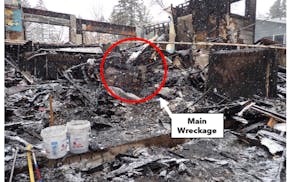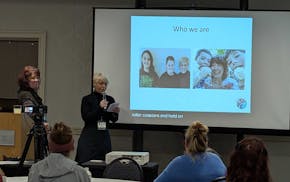We were paddling out of the Boundary Waters Canoe Area Wilderness on a summerlike day in mid-September. The lake was as smooth as glass, the pines on the distance shore were tinted white and the rising sun was brownish orange from the haze of countless wildfires raging in Montana, California and Canada. One of my companions wondered if his mobile home on Florida's east coast had been destroyed by Hurricane Irma. Having severed our connection to the civilized world five days earlier amid omens of natural, nuclear and political apocalypse, we were anxious about the news that awaited us.
The times are more than a changin'. The times are downright frightening. And yet I have hope for the future.
Whenever I meet with the graduate students in my communication course at the University of Minnesota — some of whom are managers, some of whom are busy parents of young children and some of whom are both — I'm impressed by how much they have accomplished in their lives, and I'm inspired by their promise to accomplish so much more. More than anything, I am moved by the respect with which they engage one another as we work to develop their natural talents and to address their flaws and shortcomings.
If I said I'm teaching them how to write and speak more effectively, I would be misstating what is happening. No one can teach you how to communicate, no more than anyone can teach you how to be a good person. But I can show them the way by sharing my knowledge and by striking the right balance between nurture and challenge.
At the center of our undertaking — and the human experience — is language. It all begins there. Our words are how we connect, how we express our differences, share our joys and sorrows and articulate our hopes and dreams. Our words, by some measure, are who we are.
My book club meets monthly. I'm the only guy. The women are better read, smarter and more articulate than I. But that doesn't mean I agree with everything they say. When one member suggested we need to do more than send "our thoughts and prayers" to hurricane victims, I agreed. But I also said our words matter.
I offer these personal reflections to you today as a two-part farewell. After 26 years and 999 columns, I've decided to make my next column my last. I'll miss talking with you.
Nearly every morning, traumatized by the news in my beloved newspaper, I take a walk with my wife of 41 years. As we pass the yard signs declaring love for our Muslim neighbors and proclaiming that black lives matter, I find comfort and hope. Our words shape our vision for how we want the world to be. Whether at home or in the workplace or on the world stage, we mustn't allow the language of hatred and racism to go unchallenged. Our words help determine our future.
Stephen Wilbers offers training seminars in effective business writing. E-mail him at wilbe004@umn.edu. His website is www.wilbers.com.

U.S. Bancorp executive stopped responding to control tower minutes before Brooklyn Park crash

Minneapolis condo in historic Midtown Exchange building listed for $205,000

RFK Jr.'s controversial comments draw ire at Minnesota autism convention

Big medical expenses drove $176 million operating loss last year at Medica

